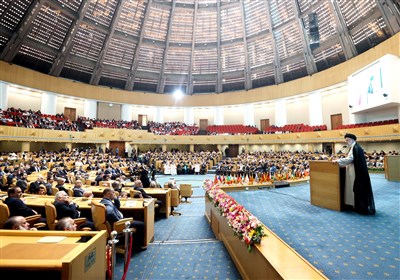US Involved in Color Revolutions in Eastern Europe amid Decline
TEHRAN (Tasnim) – A Polish politician highlighted the role of the United States in changing political realities in Eastern and Central European countries through color revolutions and by destroying the social structure of all those countries.
In an interview with the secretariat of the 2nd International Conference on the Decline of the United States: The Post-American World, the Polish politician and publicist, Mateusz Piskorski, shared his views on the decline of the United Sates.
Referring to the book The End of History by Francis Fukuyama whom together with other political scientists tried to explain the idea that there is no alternative and that the United States is the only single geopolitical force in the world, in all areas of public and human life, Piskorski focused on the decline of the United States in its Eastern and Central European policy.
“This means that on the one hand they were trying to impose their own views on geopolitics,” Piskorski believed, adding, “On the other hand, they were also trying to monopolize all other fields of life. Some countries in Central Europe were imposing the American ideology of neo-liberalism, particularly in their social, economic life, and destroying all the elements of collective identity, and going to the kind of extreme individualism which was promoted by the United States to destroy the social structure of all those countries.”
“Nevertheless, still there were some countries which were not under the control of America,” he added. “There were basically two types of countries which hadn't gone under their control. The first type was very chaotic countries like Ukraine, which were based basically on the oligarchy. On the other hand, countries like Belarus which had chosen their own unique way of economic and social development and which were not accepting the idea that there is no alternative other than the neo-liberal globalist ideology promoted by the United States. In both types of those countries, we have seen color revolutions.”
“Actually, you had also such an experience in Iran,” he went on to say, “Where they tried to organize similar destabilization of your country [after] the presidential elections several years ago. They are still doing that sometimes, by abusing the electoral periods and conflict between different candidates and try to recruit some of the members of local political elites for their own causes.”
“Concerning what has happened lately after the election of Joe Biden as the next president of the United States,” Piskorski pointed out, “we understand that the United States is withdrawing from several regions which they managed to destabilize before, and it's not only the Afghanistan or Iraq, but also some of the post-Soviet Central and Eastern European countries.”
Piskorski held that the change of strategy of the United States is necessary concerning the decline of the hegemony of the United States. He maintained that they are no more able to use technologies, which used to be very efficient in the last decade. “So, it is obvious that the United States are no more capable of keeping and funding as protectors all over the world,” he asserted, adding, “They will probably try to focus on other methods of destabilizing the internal situation in different countries like those in the Middle East or Central Asia. And probably what we have witnessed in Belarus will be also used in other parts of the world; Not acting directly, but via proxies.”
“The decline of the United States is not a process which will last for one or two years,” Piskorski added. “I think it will take another few decades for the United States to leave the international relations system. We are witnessing a multipolar world, which is shaping now.”
Piskorski said the United States is now indirectly involved in color revolutions and in changing political realities in countries, especially in Eastern Europe and Central Europe.
Concerning the change of the strategy, he continued, “The most important part of this new strategy will be first, using the proxies for each country whom the United States will be trying to find among the neighbors of the country which has an economic crisis; those neighboring countries, which are interested in the destabilization of the target country. The second point is that the proxies of the US will have more sophisticated methods when it comes to social media and the use of internet during all those protests and color revolutions.”
“That's why it's very important to find a kind of alternative, independent social media infrastructure,” Piskorski maintained. “We are witnessing now that people are leaving the American social media like Facebook, Twitter, and so on, and using more independent platforms like Telegram, which is very widely used by different people and groups in Central and Eastern parts of Europe, particularly.”
“The idea of regime change,” he said, “is an idea used to threaten several leaders, even those leaders who are still loyal to the United States, such as those involved in the Arab Spring. But on the other hand, you had the example of some leaders breaking loyalty to the United State, such as Egypt.”
“If you analyze the history,” he went on to say, “almost every falling empire became more and more aggressive, just to avoid decline; just to make the decline, degradation, and degeneration, slower. And the United States would be eager now to try to destabilize the internal situation in the Far East and Southeast Asia. And, of course, it's connected with China, and the rivalry between the United States and China.”
“We can see now that the United States is also trying to use the pro-US-oriented politicians within the Chinese Communist Party for their own purposes,” Piskorski said, “with the main purpose of the weakening the interests of the group who is in power. So, I think they will use internal conflict in different countries; it is not as expensive, by the way, as color revolutions. They will try to find some local allies, ready to put their own money to destabilize their own country, and the United States will just give the experience or perhaps send some advisors to them.”
“Some countries all over the world are now in a kind of deep shock,” Piskorski concluded, “because they still don't know what to do [about the decline of the United States]. They still don't know how to behave in a multipolar world. They got the instructions from Washington. But the instructions are not coming anymore because Washington is busy with other problems. So, these countries are probably looking for a new idea in the foreign policy because the old concept, based on the hegemony of the United States, is no longer valid. And we see also other countries which were once dominated by the United States, are now trying to realize their own national interests and, trying to turn into the direction of the multi-dimensional and multi-level foreign policy.”
The 2nd International Conference on the Decline of the United States: The Post-American World will be held on November 2, 2021, by Imam Hussein Comprehensive University and the Secretariat of the Expediency Discernment Council, in cooperation with other universities and research institutes.
For more information, interested parties may see the conference website at www.usdecline.ir and the virtual pages of the conference secretariat on social media at @usdecline.






